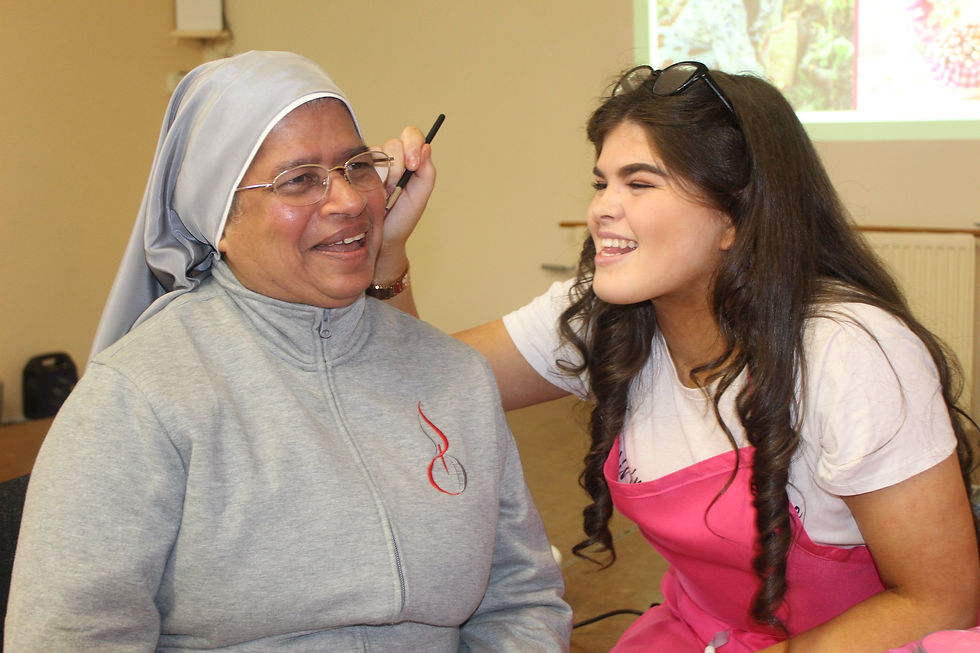Helping others is at the heart of Sister Editta's mission
- Missio Scotland
- Sep 29, 2021
- 5 min read

Gerard Gough
IN SPEAKING to priests and religious—be they in Scotland or further afield—their decision to take up a vocation and follow their mission is nearly always marked by a genuine desire to help people and make a difference to their lives, spiritual and otherwise, a determination to provide love, care and support as it were. We, as lay Catholics throughout the world, are often the beneficiaries of that love and care, however lay Catholics in their own households often foster these emotions. This is something that was evident in the story of Sister Editta Kuttikkattil of the Sisters of St Peter Claver (above), based in Bellshill.
Growing up in her native India, Sr Editta was able to witness the equally impressive examples of her father working on their land and her mother running the family home to provide for her, her four sisters and her brother. Sadly, there was also the very tragic example of her brother Anthony, who passed away at a young age, while going to the aid of his friend.
“Anthony died when he was 19 years old,” Sr Editta said. “He went to help his friend when he was swimming and the current took him. Sadly, they both died.”
However, in spite of that tragedy, it was that loving, caring family home that would act as a strong foundation for them to cope with their grief and continue of their individual life journeys. And those journeys would have a very unique faith-filled path, which can also be traced back to the family home.
“We were a very traditional Catholic family,” Sr Editta said. “We used to go to Mass every day, when it was possible. But we always went on Sunday and then to Catechism. I belong to the Syro-Malabar Rite, so we had that system that every Sunday after Mass there would be the Catechism. I was always interested in the Catechism and the Church.
“My brother was the eldest of the siblings,” Sr Editta continued. “Then there were us five girls—Anne, Elizabeth, Mary, Theresa and myself. Three of my sisters wanted to become missionaries, so they left home to do so, joining different orders. They used to write to us and tell us how happy they were. When I read that I realised that I wanted to feel that way too. My parents didn’t want me to go, because three of their girls had already gone, but my mind was made up, I wanted to be a missionary.”

Influences
While Sr Editta admitted that her sisters were a major influence on her decision, the notion of mission was something that prevalent in her life from a very early age.
“I loved that passage in the Bible that said ‘if you love me you have to leave everything and follow me,’ that really stuck me, even though I was young,” Sr Editta recalled. “Moreover, the Franciscan Sisters who taught us always spoke about helping the missions, but at that time I didn’t know exactly where they were, I guessed Africa and so on. However, there were actually missions in North India—I was from the South—so many priests and religious went to North India to do missionary work.
“So I decided I wanted to become a nun. At that time the Bishops were sending many girls to Europe because there were not many vocations there. That was round about the time that three of my sisters had already gone out on the missions, to Germany and Italy. The vocations promoter, Fr Joseph, was also influential. He suggested that I go to Rome. He knew the Sisters of St Peter Claver (SSPC) were there because he used to go to our convent in Rome and visit our Mother General. For me Fr Joseph was very like Jesus in his words and actions—his way was so simple—so he played his part too.”
Sr Editta then learned the language before heading to Italy and joining the SSPC (above) and her decision to join that particular congregation and it’s one that she doesn’t regret.
“I just loved everything that the congregation stood for and continues to stand for,” Sr Editta said. “The fact that our work meant helping missionaries and sending donations to them, wherever they were throughout the world, really appealed to me. That’s what vocation is, going out into the world and trying to live like Jesus. He is the way, the truth and the life and we must endeavour to honour Him by living humbly, being obedient and through our prayer life. In today’s world we really need people to pray for one another.”

Fortified by faith
Sr Editta’s vocation has taken her to Italy, back to India, to England and finally here to Scotland and while she admitted that getting to grips with the language—or perhaps more accurately the accents—and the weather in her latter two homes have proved to be challenging, she has been fortified by her faith and the people (above) she has encountered along the way.
“I have always drawn strength from the Eucharist,” she said. “Without it I wouldn’t stay here, because I find that wherever I go, His presence in the Eucharist is the same, if I am in India, or Africa, or here in Scotland.
“Having a Syro-Malabar community close by is wonderful too. We have Mass in Burnbank and sometimes Bishop Joseph Toal will come and read the English translation and he really enjoys it. In our rite, the prayers are so rich, so after Mass we feel as if something really moving has taken place.
“My religious community is also a strength, but in all honesty, Scottish people play their part too. They are very friendly and welcoming and I have many friends here now. They feel like I am one of their own. I might have left what was my home in India, but now Scotland is what I consider home.”

Dedication to mission
Although Sr Editta is comfortable here in Scotland (above), that doesn’t mean that she is taking her approach to mission lightly. In fact she spoke fervently about her dedication to mission—paying particular attention to the prayerful aspect—while also stating that it is not optional and rather a Christian obligation.
“It’s really important to help the missionaries to carry out their work, “ she said. “Sometimes it might feel monotonous, but we do it because we have a real desire to help them. There always has to be that dedication to help people.
“Mission is proclaiming Christ’s Gospel to others and in our daily lives we have to find a way to do that. A few years ago we started the Lectio Divina in the parish and that is one way we can do it. It is a proclamation—in a small way—of living the Gospel. Living our lives through the Sacraments plays its part too, because they give us a chance to grow in faith. We also visit the sick and that is part of living out the Gospel message as well. Through our kindness we can show Jesus to others.
“Missio Scotland is an important charity because it reminds us that every Christian has an obligation to promote missionary work. We all are called to help the missions and missionary work. People in the mission countries need support. India is often considered a rich country, but there are parts that nobody knows, that are relatively primitive, so they need help. People from Europe are often generous in that regard."
Like us on Facebook: http://www.facebook.com/missioscotland and follow us on Twitter: @Missio_Scotland
To donate to Missio Scotland, you can visit the following page on this website: http://www.missioscotland.com/donate, you can e-mail: admin@missioscotland.com or send donations to: Missio Scotland, St Andrews, 4 Laird Street, Coatbridge ML5 3LJ






Comments